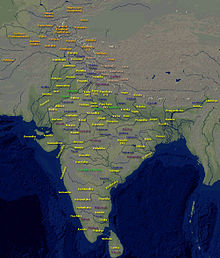| Revision as of 14:01, 9 July 2011 edit117.227.10.106 (talk)No edit summary← Previous edit | Revision as of 04:59, 13 January 2012 edit undo152.3.68.8 (talk) →Description in RamayanaNext edit → | ||
| Line 4: | Line 4: | ||
| ==Description in Ramayana== | ==Description in Ramayana== | ||
| The main profession of Nishaadas was hunting birds. When a Nishaada had killed one bird from a pair, the other bird was |
The main profession of Nishaadas was hunting birds. When a Nishaada had killed one bird from a pair, the other bird was remorseful of its loss and was in pangs of pain, observing this deep pain inspired the sage ] to write the life history of king ] of ] and his dutiful wife queen ], who lived in separation due to her capture by deceit by the egoistic demon-like king ]. This poetic historical record is revered in ] as a guide to highest ideals of human-life, is known as the ], or the record of king Rama's life.<ref>Ramayana by Valmiki, ] publication, Gorakhpur, India</ref> In Ramayana, the king of Nishaadas, named Guha, was a very close friend of Rama. He helps Rama and Sita to cross ] river. | ||
| ==Description in Mahabharata== | ==Description in Mahabharata== | ||
Revision as of 04:59, 13 January 2012

Nishadha (Sanskrit: निशादniṣāda) were scattered peoples, according to sources in Hindu mythology. The Nishadha people have been described in Ramayana and Mahabharata.
Description in Ramayana
The main profession of Nishaadas was hunting birds. When a Nishaada had killed one bird from a pair, the other bird was remorseful of its loss and was in pangs of pain, observing this deep pain inspired the sage Valmiki to write the life history of king Rama of Ayodhya and his dutiful wife queen Sita, who lived in separation due to her capture by deceit by the egoistic demon-like king Ravana. This poetic historical record is revered in India as a guide to highest ideals of human-life, is known as the Ramayana, or the record of king Rama's life. In Ramayana, the king of Nishaadas, named Guha, was a very close friend of Rama. He helps Rama and Sita to cross Ganges river.
Description in Mahabharata
The Mahabharata speaks of Nishaada (or Shabara) as forest hunters.
Music
In Indian music, Nishada is the seventh note (swara) of the octave.
See also
References
- Ramayana by Valmiki, Gita Press publication, Gorakhpur, India
- The Cultural Process in India by Irawati Karve, Vol. 51, Oct., 1951 (Oct., 1951), pp. 135-138
| Hindu deities and texts | ||
|---|---|---|
| Gods |  | |
| Goddesses | ||
| Other deities | ||
| Texts (list) | ||
This Hindu mythology–related article is a stub. You can help Misplaced Pages by expanding it. |